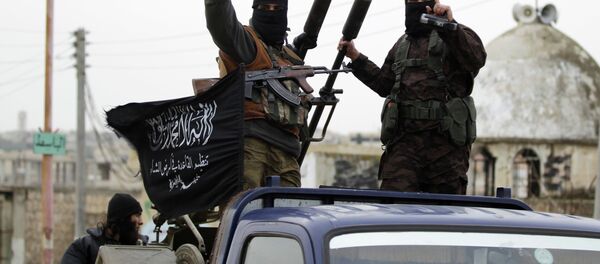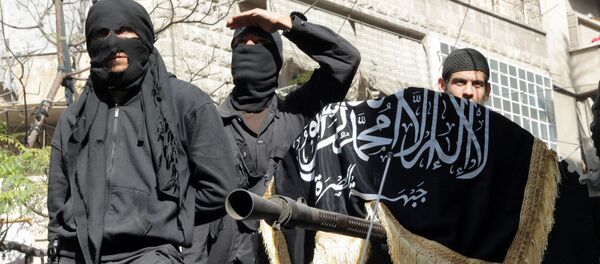Paraphrasing Western officials, NYT reported that "the movement of senior Qaeda jihadists [into Syria] reflects Syria's growing importance to the terrorist organization and most likely foreshadows an escalation of the group's bloody rivalry with the Islamic State."
Earlier this month, al-Zawahiri issued a 10-minute audio recording talking about a new Syrian caliphate, and saying that it would have nothing to do with the "renegades and extremists" from Daesh. The two Wahhabist terrorist splintered off from one another in 2013, with periodic political infighting going back to the mid-2000s.
According to sources cited by NYT, al-Qaeda's establishment of a firmer presence in war-torn Syria "would present the group with an invaluable opportunity."
"A Syria-based Qaeda state would not only be within closer striking distance of Europe but also benefit from the recruiting and logistical support of fighters from Iraq, Turkey, Jordan and Lebanon," NYT warned.
The Importance of the Brand
The terror group "would present itself as a smart, methodical and persistent jihadi movement [which], in contrast to the Islamic State, had adopted a strategy more aligned with everyday Sunni Muslims," Lister added.
'Get 'Em All, Let God Sort 'Em Out…'
Speaking to Russia's Izvestia newspaper, Vyacheslav Tetekin, a member of the Russian parliament's Defense Committee, said that there is no need to dramatize the situation around Al-Qaeda's apparent plans.
"In Syria there aren't just two fronts, or two caliphates. Each terrorist organization participating in the hostilities thinks itself to be the master. In addition to al-Qaeda [through Nusra Front] and Daesh, there are plenty of other groups of bandits. However, each of them is under the direct or indirect control of Western intelligence agencies. Therefore, I would not talk about any fundamental changes."
In any case, Izvestia wrote, "whatever happens, al-Qaeda should hardly expect to find a warm welcome in Syria. And it's not even so much about Syrian government forces' readiness to destroy extremists of all stripes, so much as the reluctance on the part of their fellow terrorists to see competitors in the occupied territories. This is particularly true of Daesh. It's worth recalling that this group, which was initially called 'Al-Qaeda in Iraq', was subordinate, as the name suggests, to al-Zawahiri."
Speaking to Izvestia, Lev Korolkov, a veteran of the Russian Foreign Intelligence Service (SVR) emphasized that ultimately, al-Qaeda's primarily goal "is not to lose face. Furthermore, its leaders understand that the key to a terrorist organization's future existence is funding; it allows the group to purchase weapons and recruit fighters. Obviously, the militant group has faced problems, and because of this its leader is attempting to draw attention to himself and to restore al-Qaeda's former standing," among the adherents of jihadi terrorists, anyway.





